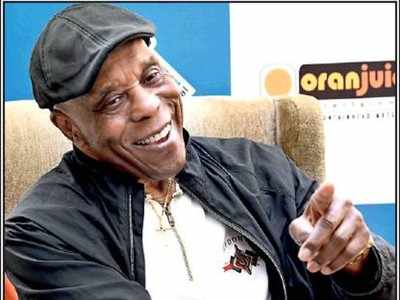
Buddy Guy, pioneer and last living link to the storied history of the original Chicago blues, doesn’t seem to mind when you try and tease the personal out of him. As he returns at 83 to perform at the tenth edition of the Mahindra Blues Fest, the painfully shy legend — who was born George Guy to a sharecropper’s family in a small town near New Orleans and who fashioned his first guitar out of wood and his mother’s hairpins — lets TOI in on everything from his secret debutante tears to his preferred form of liquid courage.
Q: You’ve been coming to India for years now. What keeps bringing you back?
A: I wish people in the world wouldn’t have any worries or be angry. Music makes people smile and the ones that aren’t smiling, I hope my coming here can make them smile. And to be invited to come here to try and make people happy is always a joy to me. So when I pick up my guitar on Sunday night and get smiles out of people I can go to sleep and sleep well.
Q: You had declared that the “blues live here” when you kicked off this festival ten years ago. What made you feel that a genre with its roots in America’s Deep South could find a home here?
A: To me, music is a worldwide language. You don’t have to try to explain to someone how to understand whatever kind of language you speak; if you play music, it speaks in all languages. I was blessed enough to teach myself how to play music and blessed enough to play well enough to be invited here and other countries around the world.
Q: How did George Guy become Buddy Guy?
A: It’s a little name that families would give their child other than their original name. I was Buddy from the first day I was born. They tried to get me to change it when I made my first recording. They wanted me to be a ‘King’ like BB King and I said, ‘no’. I didn’t want to be a King because that was BB’s and finally when BB and I became friends I told him what they were trying to sell because a lot of Mo (Town) guys had actually accepted that. I just wanted to stick to being Buddy Guy. If that didn’t work, I wanted it to go my way.
Q: Do you remember your first time on stage?
A: Yes, it was in Louisiana. I was trying to go to high school and my mother couldn’t afford to send me. So this guy told me, ‘if you play guitar you could make enough money to send yourself to school’. And when they called me on stage for my first performance I just turned my back to the audience and I cried because I was shy. I’m still shy. I’ve been here before but you get nervous before you come and play.
Q: Who inspires you today and what keeps you motivated?
A: Listening to other music. I don’t read music. I listen and learn by ear. That’s how I learnt it from Muddy Waters, BB King, Howlin’ Wolf and all the great players. Even the jazz players like Miles Davis I listen to, a lot. And all these kids on this show that I’ll be with, I’m going to keep my eyes and ears open because that’s what gives me the motivation to go on and try to be better. I even learn from hip-hop. The more you hear, that much more you know.
Q: What is the best thing about the Legends Club in Chicago where both old school players and fresh talent get to perform?
A: Blues musicians not many throughout the world are left. You could go to Brazil, Japan, and all over Europe but they’ve all disappeared because they couldn’t survive. And that’s why I opened the club because I saw that coming and I couldn’t let it die just like my last album. My mother used to tell me, when it’s music or sports, you crawl before you walk and that’s what music is.
Q: You’ve always said you feel this responsibility as one of the last custodians of this genre. What is the future of blues?
A: A lot of radio stations across America and Canada or Europe don’t play blues much anymore. When I grew up, we could hear everything — jazz, blues and gospel. I don’t just want to listen to Buddy Guy when I listen to the blues today. I want to be able to listen to Keb’ Mo’, Kenny Wayne, Frank Sinatra, Miles Davis. That’s good listening to me.
Q: Do you see a shift in the blues form from the time you started and the way it is played now?
A: Yes, and tech has a lot to do with it. Even when I pick up my guitar they look at me and say I don’t sound like I used to. It’s not me. I’m the same person, it’s the instrument. I won’t be surprised if one day I walk up and find a Robot Buddy Guy playing!
FacebookTwitterLinkedinEMail